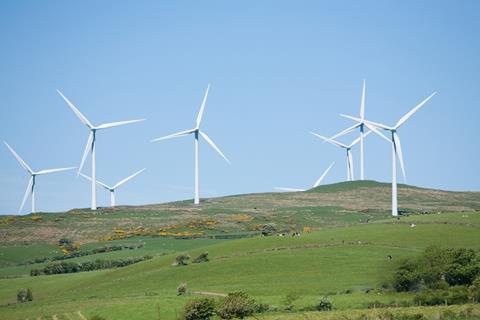Communities which support wind farms could be given up to 50% off their energy bills

Rishi Sunak has implemented a delayed plan to relax planning rules for onshore wind schemes following a second rebellion from Tory backbenchers.
Communities which support wind farms could be given up to 50% off their energy bills, and councils will have more ways of identifying sites under the changes.
Consultations on schemes will also be allowed online, which is expected to encourage more young people, who are more likely to support the projects, to voice their support.
Wind schemes can be blocked by just one local objection under rules put in place by David Cameron in 2015. Research by the University of the West of England found onshore wind approvals had fallen by 97% between 2016 and 2021 compared to the period 2009-2014.
Sunak promised to retain the effective ban when he became prime minister last year, but changed his position in December following the initial backbench rebellion.
He said he would ease the restrictions by the end of April this year but slow progress provoked the group of 25 MPs, led by former COP26 president Alok Sharma and including Liz Truss, to revolt for a second time.
Communities secretary Michael Gove said: “Current policy has been applied in such a way that a very limited number of objections, and even at times objections of single individuals, have been taken as showing a lack of community backing. This is not the policy intent.”
He added: “We need to strike the right balance to ensure that local authorities can respond more flexibly to suitable opportunities for onshore wind energy, contributing to electricity bill savings and increasing our energy security as well as respecting the views of their local communities.”
“We hope that this will mean sites are identified more quickly, speeding up the process of allocating sites for onshore wind projects, and as a consequence more clean and renewable energy is generated sooner.”
However, Labour and renewable energy experts have said the measures do not go far enough, and that onshore windfarms will still be harder to approve than other types of schemes.
Shadow climate secretary Ed Miliband said ministers had “bottled it again on onshore wind. It still remains easier to build an incinerator or a landfill site than onshore wind. The planning system remains stacked against onshore wind. This will mean higher bills and energy insecurity for Britain.”
Meanwhile, the government has been urged to unlock more offshore energy projects over the next decade. David Whitehouse, chief executive of Offshore Energies UK, said total public and private sector spending on offshore wind, oil and gas, carbon capture and hydrogen could reach £200bn in the next decade, but that nearly half of this was being held up by the planning system or is waiting on company or government approvals.
















No comments yet